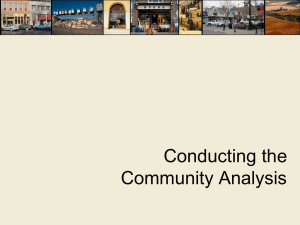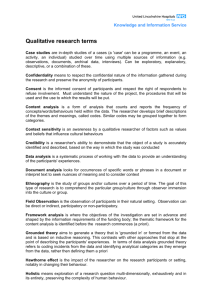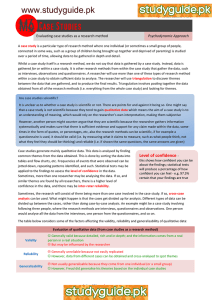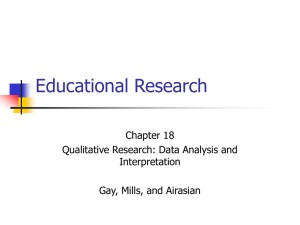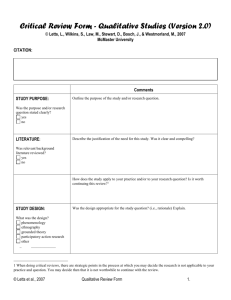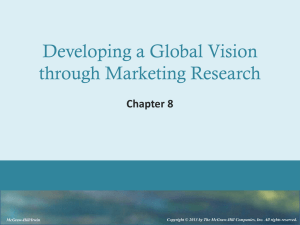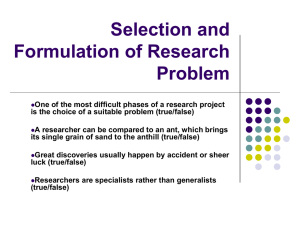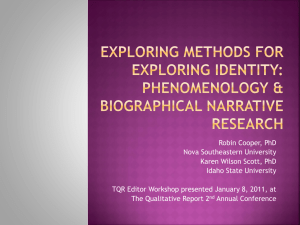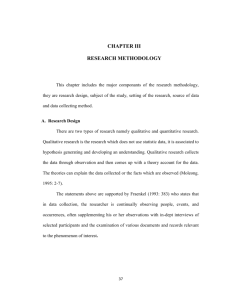Qualitative Research Glossary: Key Terms & Definitions
advertisement
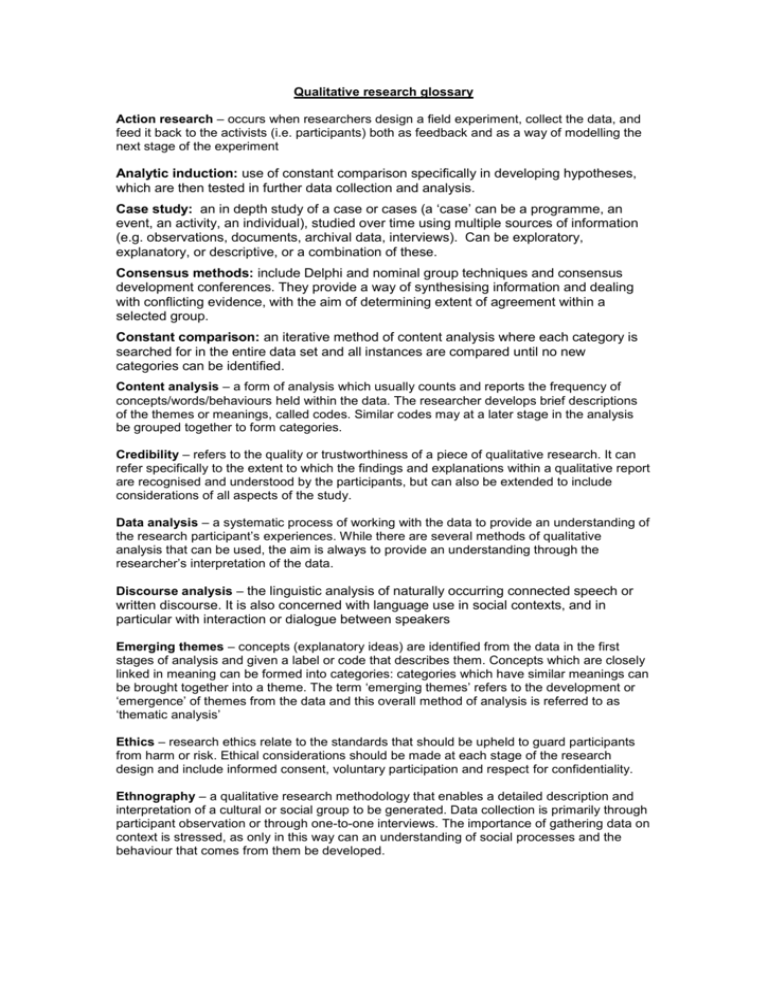
Qualitative research glossary Action research – occurs when researchers design a field experiment, collect the data, and feed it back to the activists (i.e. participants) both as feedback and as a way of modelling the next stage of the experiment Analytic induction: use of constant comparison specifically in developing hypotheses, which are then tested in further data collection and analysis. Case study: an in depth study of a case or cases (a ‘case’ can be a programme, an event, an activity, an individual), studied over time using multiple sources of information (e.g. observations, documents, archival data, interviews). Can be exploratory, explanatory, or descriptive, or a combination of these. Consensus methods: include Delphi and nominal group techniques and consensus development conferences. They provide a way of synthesising information and dealing with conflicting evidence, with the aim of determining extent of agreement within a selected group. Constant comparison: an iterative method of content analysis where each category is searched for in the entire data set and all instances are compared until no new categories can be identified. Content analysis – a form of analysis which usually counts and reports the frequency of concepts/words/behaviours held within the data. The researcher develops brief descriptions of the themes or meanings, called codes. Similar codes may at a later stage in the analysis be grouped together to form categories. Credibility – refers to the quality or trustworthiness of a piece of qualitative research. It can refer specifically to the extent to which the findings and explanations within a qualitative report are recognised and understood by the participants, but can also be extended to include considerations of all aspects of the study. Data analysis – a systematic process of working with the data to provide an understanding of the research participant’s experiences. While there are several methods of qualitative analysis that can be used, the aim is always to provide an understanding through the researcher’s interpretation of the data. Discourse analysis – the linguistic analysis of naturally occurring connected speech or written discourse. It is also concerned with language use in social contexts, and in particular with interaction or dialogue between speakers Emerging themes – concepts (explanatory ideas) are identified from the data in the first stages of analysis and given a label or code that describes them. Concepts which are closely linked in meaning can be formed into categories: categories which have similar meanings can be brought together into a theme. The term ‘emerging themes’ refers to the development or ‘emergence’ of themes from the data and this overall method of analysis is referred to as ‘thematic analysis’ Ethics – research ethics relate to the standards that should be upheld to guard participants from harm or risk. Ethical considerations should be made at each stage of the research design and include informed consent, voluntary participation and respect for confidentiality. Ethnography – a qualitative research methodology that enables a detailed description and interpretation of a cultural or social group to be generated. Data collection is primarily through participant observation or through one-to-one interviews. The importance of gathering data on context is stressed, as only in this way can an understanding of social processes and the behaviour that comes from them be developed. Field notes: a collective term for records of observation, talk, interview transcripts, or documentary sources. Typically includes a field diary, which provides a record of chronological events and development of research as well as the researcher’s own reactions to, feeling about, and opinions of the research process Focus groups – used to elicit the views of a group (usually around 6 to 10 individuals) who have common experiences or interests. They are brought together with the purpose of discussing a particular subject, under the guidance of a facilitator. ‘Framework’: a method of qualitative data analysis involving five key stages: familiarisation, identifying a thematic framework, indexing, charting, and mapping and interpretation Grounded theory – a qualitative research methodology with systematic guides for the collection and analysis of data, that aims to generate a theory that is ‘grounded in’ or formed from the data and is based on inductive reasoning. This contrasts with other approaches that stop at the point of describing the participants’ experiences. Hawthorne effect: the impact of the researcher on the research participants or setting, notably in changing their behaviour. Holistic – exploration of a research question multi-dimensionally, exhaustively and in its entirety, preserving the complexity of human behaviour. Induction (an inductive process) – logical thought process in which generalisations are developed from specific observations: reasoning moves from the particular to the general. E.g. Grounded theory uses an inductive process, i.e. explores new, unforeseen issues that emerge during the research and theories develop/hypotheses are generated from the data. Interpretative – exploration of the human experiential interpretation of any observed phenomena. Enables researchers to gain a better understanding of the underlying processes that may influence behaviour Interviewing: a data collection strategy in which participants are asked to talk about the area under consideration. Interviews can be: Unstructured/in-depth – the researcher asks the respondent a general question regarding the area of interest and asks them to tell their own story. Semi-structured – the interviewer has a slightly more focused agenda than in an unstructured interview. Questions are phrased to allow the participants to tell the story in their own way and an interview guide is used to ensure information is gathered on areas of interest to the researcher. Structured – an interview in which the questions are pre-determined and asked to all subjects. Closed questions are used with limited response choices. Iteration (an iterative process) – relates to the process of repeatedly returning to the source of the data to ensure that the understandings are truly coming from the data. In practice this means a constant process of collecting data, carrying out a preliminary analysis, and using that to guide the next piece of data collection and continuing this pattern until the data collection is complete. Natural setting (naturalistic research) – the normal environment for the research participants for the issues being researched. Observation – a strategy for data collection, involving the process of watching participants directly in the natural setting. Observation can be participative (i.e. taking part in the activity) or non-participative (the researcher watches from the outside) Phenomenology – an approach that allows the meaning of having experienced the phenomenon under investigation to be described, as opposed to a description of what the experience was. This approach allows the reader to have a better understanding of what it was like to have experienced a particular phenomenon. Reflexivity – the open acknowledgement by the researcher of the central role they play in the research process. A reflexive approach considers and makes explicit the effect the researcher may have had on the research findings. Respondent validation – refers to seeking the participants’ views of the initial interpretations of the data. The aim is not to ensure that the researcher are in agreement as to the meaning of the data, but that the researcher has the opportunity to incorporate the participants’ responses into the analysis. Sampling – the process of selecting participants to take part in the research on the basis that they can provide detailed information that is relevant to the enquiry. Purposive sampling – the selection of participants who have knowledge or experience of the area being investigated. Theoretical sampling – a sampling strategy in which the selection of participants is guided by the ideas that are emerging from the data analysis. Saturation – the point at which no further themes are generated when data from more participants are included in the analysis. The sampling process can be considered to be complete at this point. Transferability: means that the research findings can be transferred from one context to similar situations or participants. Triangulation – process by which the area under investigation is looked at from different (two or more) perspectives. These can include two or more methods, sample groups or investigators. Used to ensure that the understanding of an area is as complete as possible or to confirm interpretation through the comparison of different data sources.
